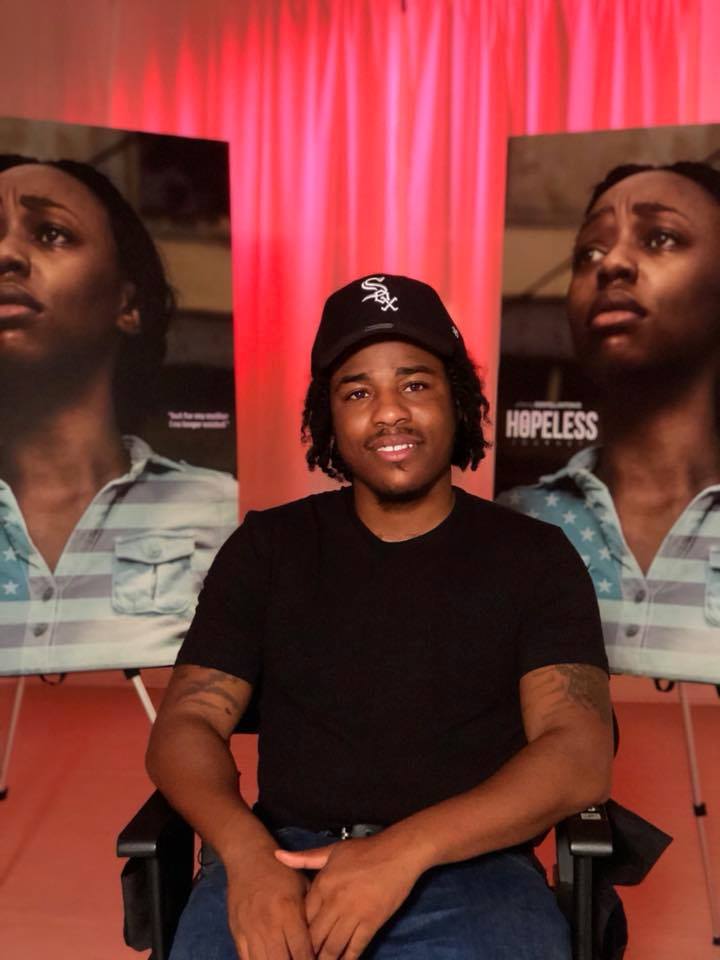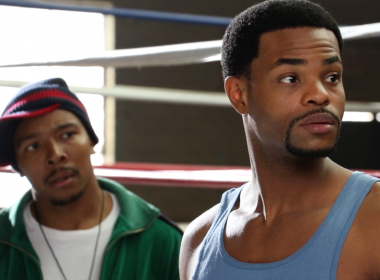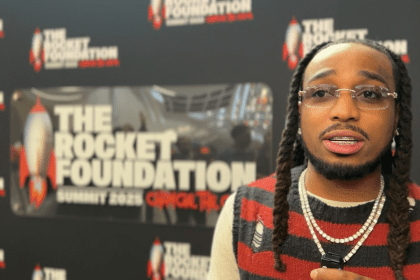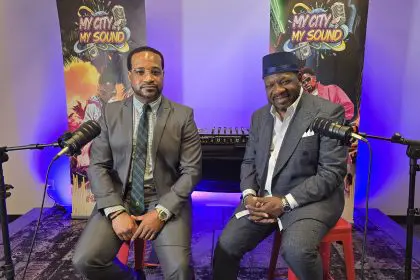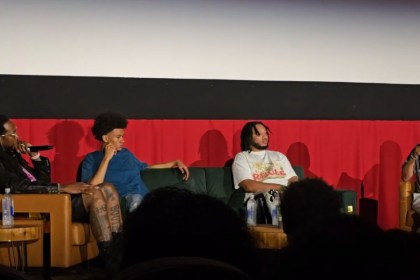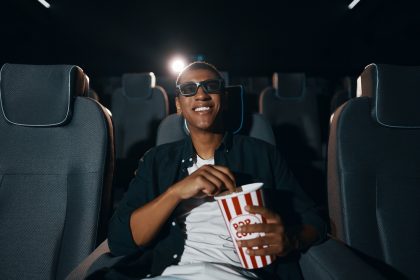
Film director Corey Grant is back at it again after the success of Sister Code with his newest production Illicit. The steamy drama follows the story of Guy Curtis (David Ramsey) and Sasha Curtis (Shireen Crutchfield), a married couple tested when sexy, young lovers, both with dark pasts and hidden nefarious agendas, independently seduce them. Vivica A. Fox, McKinley Freeman, Essence Atkins and Dean Cain will also be making appearances in the film.
New Breed Entertainment recently hosted the world premiere at Regal Cinemas South Beach 18 & IMAX in Miami and according to Grant, he has heard nothing but great feedback. “We have been getting a great response and I think that if people want to see something that is both commercial yet original then this is definitely a movie they will want to see. It’s definitely for couples to see together because it will cause a lot of conversation afterward,” says Grant. He also hopes Illicit will release in theaters nationwide sometime this year and is currently finalizing the distribution.
Want more information on Illicit? Go to www.illicitmovie.com and check out the trailer at https://bit.ly/Illicit.
Here’s a recap for the interview below:
What life event inspired you to write the script for Illicit?
There are elements in the script that are true but the story is fictional. The story came about from one of my producing partners Vince Frazier. We like the movie “Unfaithful” with Richard Gere. He was telling me a story about when he was going to see that movie in the theater and he was watching a wife cheat on her husband. He was observing the men sitting in the audience with their wives and their girlfriends and how they were reacting. They looked very uncomfortable. We just got a kick out of it. I said wouldn’t it be interesting if we did something similar but had it to where both the husband and the wife would be simultaneously cheating. That is how we got the basic premise of what the story would be.
There are a lot of familiar faces in the film. Walk me through step-by-step of how you selected the cast for Illicit.
David Ramsey who is our lead has been good friends for some years. We always said we wanted to do a good movie together. His TV show is drama but is also action-based. I wanted to put him in something where he could kind of stretch his dramatic acting skills. He saw the script and loved it. McKinley Freeman who I was familiar with from “Hit the Floor” was a good friend of my producing partner. When I met him he just seemed like the perfect fit. Those guys came on early so at that point, the female lead who is played by Shireen Clutchfield is a former model. She actually came in and read. I was familiar with her from the singing group The Good Girls. She came in and nailed it. We called Vivica who is a friend and she liked the script and agreed to come on board to work with us. With Essence Atkins it was the same thing. I worked with her on a previous movie. We also did an open casting for a couple other roles. That’s how it came together. The chemistry was just really good I am very happy with the cast.
Which was the most difficult character to cast in the film?
I think the most difficult character to cast was the mistress of our lead character. Her character is very complex and we want people to like her. In order to like her, you have to be able to follow her on her journey. I am trying to say it without giving up everything. She had to be a character that you didn’t see coming. She had to have a level of likeness and vulnerability to her so the things that she does towards the middle and the end of the movie are a complete surprise.
What is your favorite part of the production process?
It’s a long process in terms of all the different aspects of it. To be honest with you the thing that I love the most is working with the crew, the producers and the actors. You’re with these people for so much time and they become like your family. When you have really good people that you’re working with you get attached. When it’s time to wrap the movie it almost feels like summer camp when it’s over. You go through something we like to call post-production depression. Being able to collaborate with the cast and crew is what I love the most. It’s a very tedious and a stressful process at times but it’s also a lot of fun and it brings you closer to people.
How have you discovered members of your team and how do you keep the relationship with them strong?
One thing is that it’s about respect. You have to understand that when you’re making a movie it’s a collaborative process. Everybody has a very important aspect that they bring to the table. It has to be respected and listened to. It’s made by a committee and is not a dictatorship. People that run their movies with no collaboration you can see the results of that in the final project. I have developed my relationship with my team over some years. This is the first movie where everything was done in-house with just my family. It was less stressful. There was no bickering or egos involved. Everyone gave their best.
How do you raise the money to produce your independent projects? Have you used crowdfunding sites like Indiegogo or GoFundMe?
I started before the crowdfunding wave. I haven’t really had to go the crowdfunding route. I’ve kind of shied away from it for various reasons. I think that when people see you doing crowdfunding they look at your content as being less than. They don’t see Steven Spielberg or John Singelton crowdfunding so they look at is as less than. It can put a stigma on you if people know that you had previous work. I had a big issue when Spike Lee used crowdfunding because he didn’t need it with the amount of money that he is making. He could have funded that movie himself. When you crowdfund all that money comes back to you so you don’t have to pay anybody back. I think it should be left for people who need it and can use that platform for what it’s supposed to be.
What do you feel is missing in the filmmaking business today?
Well, it’s a couple of things. The studios were geared towards big blockbuster movies or established franchises which leaves a lot to be desired in terms of other types of stories that people want to tell. A lot of the better stories are going to TV now. TV is now the medium that is more interesting and takes more chances. If you want to go into Black films, in general, I think our biggest issue is a lack of choices. There is not a lot of variety of films that they allow us to release as far as the studios are concerned. Slave movies are big business for the studios now so they flood us with those. I like those movies but the problem most people are having is that there isn’t a balance. The other problem is our audience. There are a lot of independent movies that are coming on tackling a lot of original stories and content but we like to wait until it comes out on Netflix. We look down upon our own content. Unless it’s being presented to us on a plate from the studio we don’t respect it. They say we only get five to six Black movies a year, but we get tons of independent Black movies released every year that we look at as less than because they aren’t coming from the major studios. We have to start supporting our own content that we make as African Americans. Once we do that we will get a lot of our power back.
How is illegal downloading impacting your business?
Of course. I did a movie called “Big Foot: The Lost Coast Tapes” which was a horror-thriller with a predominantly White cast. It has been my most popular movie to date, but it’s in a completely different genre. Before that movie even came out I was already seeing leaks to it on the internet. Privacy is very,very hard. I was in L.A. walking down the street and someone was trying to sell me DVDs. It was the first time it happened so I wanted to look and see what he had and he had my movies in there. That turned into a big mess. I had to take my movies out. I was so mad and from that day on I don’t look at any bootleggers. I just keep going because I don’t want to see any of my product there. It does affect your bottom line and it does drive down your prices but at the same time most of the people that buy bootlegs won’t go to the theaters anyway. If anything it get’s your name out there more. We have to keep track when we send things out to post-production houses because they sometimes leak them out. We also have to be careful who we send personal links to, but now we have passwords with digital links.
Years ago, the film industry had only two screens: the movie screen and the television screen. Now there are also computers, tablets, and phones. As a creator, how does this affect the stories you tell and how you tell them?
With so many outlets to get your content out, it gives you the opportunity to do so many different things as opposed to some years ago. It was limited and it was hard trying to find money to do it. Now the good thing is technology has changed and is affordable if you want to do small films. You can go out and get a camera anywhere and just knock it out. It is accessible but at the same time because it is everybody pushes things off as great content. You have to really look to find the gems. Anybody can put up a film or web series on YouTube now. It empowers the creatives because now they have an outlet directly to their audience. There is good and bad that comes with it.
Do filmmakers have any responsibility to culture?
Definitely, there’s a lot of power when you can get people all together in one room and have their attention for an hour to two hours. What you put out there effects people. Anytime you have a chance to get an audience that makes it your responsibility to leave them with something that resonates with them both emotionally and intellectually. You have to entertain but in every movie that I’ve done I’ve always tried to keep an underlying tone or theme in it to make people feel a certain kind of way or move them in a positive direction.
What genres would you like to explore in the future?
People always ask me what’s your genre and what do you like to do those most. I do them all because I like different types of movies. I feel as a fan you should be able to do any particular genre that you want to do as long as you can execute the story. As far as what I would like to do is Sci-FI. That is my first love. I am one of those “Star Wars” kids. Eventually, I want to get off into those things, which is why I did the bigfoot movie to show people that I am capable of doing those things. In general, it’s all about the scripts that I write or that I acquire that will determine which way we go. Comedy is always fun but it is getting to be too easy for me which is why we went with this thriller thing. I just want to be challenged. It just depends on where the financing is coming from or what’s the next thing up.

